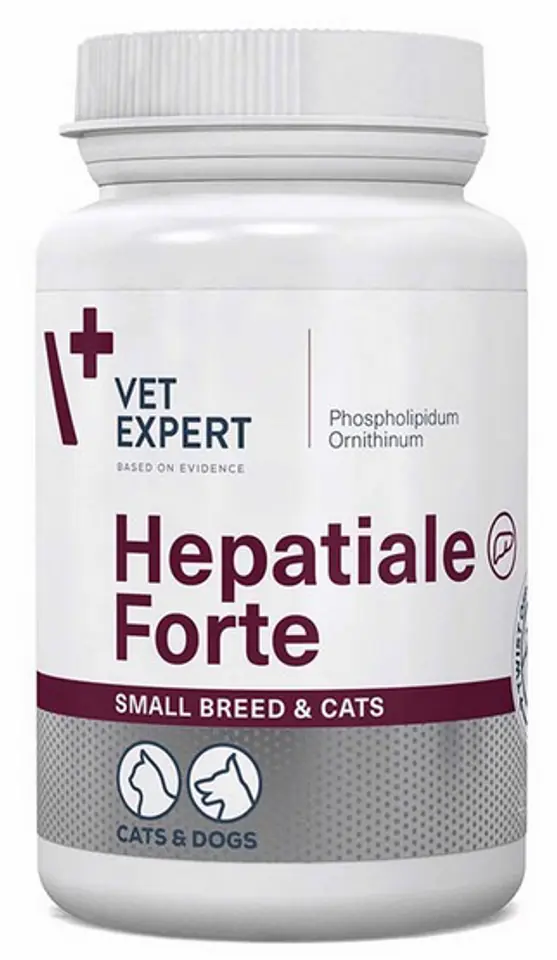Hepatiale® Forte and Hepatiale® Forte Large Breed – a preparation in tablets, available in two versions.
Hepatiale® Forte Small breed & cats – in twist-off capsules, created especially for cats and dogs of small breeds.
Destiny:
Hepatiale® Forte is used in dogs and cats. The preparation is recommended to support liver function in cases of insufficiency and functional disorders.
Hepatiale® Forte - Mechanism of action
- The preparation is intended for dogs and cats with functional disorders and liver diseases. The main active substance is phosphatidylcholine (obtained from soybeans) containing choline and ornithine aspartate (as a source of ornithine).
- Phosphatidylcholines are compounds from the group of phospholipids containing the choline group. They are the main components of biological membranes obtained by chemical or mechanical extraction from commonly available raw materials, such as egg yolks, soybeans, beans. They are also components of the lectin group of yellow-brown fatty substance found in the tissue of plants and animals. Most tissue choline is found in specialized fat molecules – phospholipids, the most famous of which is choline phosphatidylcholine (lectin).
- Fat and cholesterol from food are transported to the liver using lipoproteins called chylomicrons. Then, very low-density lipoproteins (VLDL) are formed in the liver, which are transported with the blood to the appropriate tissues. One of the components of VLDL is phosphatidylcholine, without the presence of which fat and cholesterol would be stored in the liver.
- As a result of choline deficiency, the following mechanisms are triggered in the body: a) choline deficiency causes liver damage, and the resulting liver cells are more sensitive to the effects of carcinogenic substances; (b) choline deficiency leads to a decrease in the level of DNA methylation, resulting in disturbances in the DNA repair process; c) choline deficiency causes an increase in oxidative stress in the liver, which increases the likelihood of DNA damage ; (d) choline deficiency may lead to disorders in the process of apoptosis of liver cells, contributing to the development of liver cancer; (e) choline deficiency causes activation of intercellular signalling molecules and type C protein kinase, resulting in a cascade of processes that are still being studied.
- Phospholipids derived from food are incorporated into the cell membranes of hepatocytes, which allows their faster regeneration. They are also necessary for the proper course of proliferation processes and differentiation of hepatocytes. They can also inhibit the activity of collagen-producing enzymes during liver fibrosis.
- L-ornithine L-aspartate is a stable salt of two natural endogenous L-amino acids: ornithine and aspartic acid. On sale it occurs as a dietary supplement administered to reduce the concentration of ammonia in the blood. This leads to the disappearance of the symptoms of hepatic encephalopathy associated with cirrhosis. Both amino acids play an important role in the detoxification of ammonia and the biosynthesis of proline and polyamines. Polyamines are considered to play a key role in DNA synthesis and cell replication, as well as stimulating liver regeneration. Supplementation with ornithine increases scar strength and collagen deposition in animal models. In vitro, in vivo and perfused organ studies have shown that the synthesis of urea from ammonia is limited by endogenous ornithine, which can pharmacologically stimulate urea formation to a greater extent than ammonia. Administration of LOLA in high doses reduces the high concentration of ammonia in the blood caused by both ammonium chloride, protein intake, and also occurring as a clinical complication in cirrhosis. In health and with a proper diet, L-ornitya and L-aspartate are synthesized de novo in sufficient quantities. In disease states, tissue damage, organ failure, excessive metabolism, during the period of growth, pregnancy or lack of enzymes of the urea cycle, the diet should be supplemented with L-aspartate and L-ornithine.
- A review of available studies shows that there is evidence, resulting from physiology, justifying the use of a diet supplemented with L-aspartate and L-ornithine, depending on the physiological, metabolic or pathological condition of the patient. In states of ornithine deficiency, daily LOLA supplementation should be sufficient to obtain an adequate concentration of ornithine in tissues, which prevents postprandial hyperammonemia, as well as to stimulate tissue regeneration (Sikorska et al., 2010).
Composition:
Oilseeds, oil fruits and their derived products. Phospholipids (phospholipidum ex soya) containing phosphatidylcholine. Ornithine in the form of L-ornithine L-aspartate
Dosage:
HepatialeForte®
- 1 tablet per 15 kg of body weight
HepatialeForte®Large Breed
- 1 tablet per 25 kg of body weight
Give the tablets whole or crushed, before or during a meal. If the daily dose provides for the administration of several tablets, they can be applied 2 or 3 times a day.
HepatialeForte®small breed & cats (twist-off capsules)
- Cats: 1 capsule a day
- Dogs: 1 capsule per 5 kg of body weight per day.
The contents of the twist-off capsule can be given whole into the mouth or mixed with food.

